For this story, dear reader, and rest assured it is a story full of fear and mystery, I shall take you to a city in the South Bohemia region of the Czech Republic. This city is Český Krumlov.
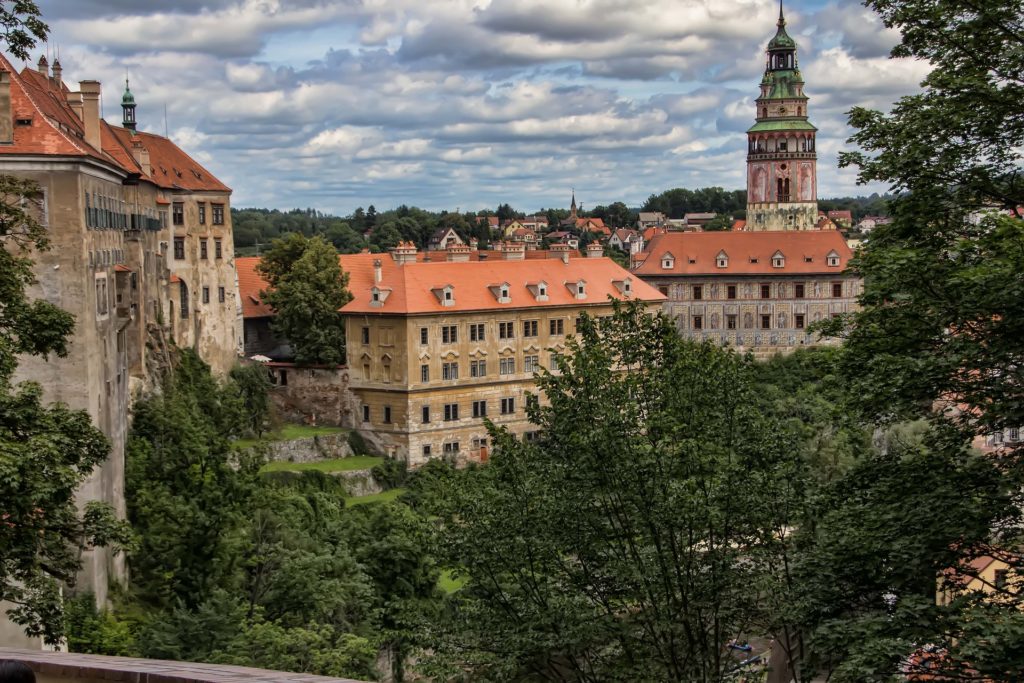
The Rosenbergs of Old and the Ghostly City – Historical Facts
In the late 16th century, Český Krumlov – a town known for its winding streets and beautiful architecture, was ruled over by a man by the name of Peter Vok von Rosenberg, the last of the Rosenberg lineage. The Rosenbergs were a prominent Bohemian noble family, and they played a key role in Czech history from the 13th century, until the year 1611. That is when Peter Vok passed on, ending the line “by sword“ – with a male as the last living member.
During its time, members of the Rosenberg family held various posts at the Prague royal (and later imperial) court, and were viewed as very powerful lords of the Kingdom of Bohemia. As the last surviving Rosenberg, Peter Vok had to contemplate the future of his family’s legacy. He faced challenges from childlessness in his marriage to Kateřina of Ludanice, to grave financial trouble. Ultimately, on October 26th, 1601, he made the decision to sell the Rosenberg ancestral residence – Castle Český Krumlov, to the Holy Roman Emperor Rudolf II, who had previously made Prague the seat of the Holy Roman Crown.
The last Rosenberg left his city behind on April 3rd, 1602, just before Easter, ending the three-century-long era of Rosenbergs at Český Krumlov. Once a powerful aristocratic stronghold, the castle’s significance somewhat diminished for a time, however in 1605, a new chapter unfolded when the castle became the home of Don Julius d’Austria, the illegitimate and deeply troubled son of Emperor Rudolf II.
‘Awful tyrant and devil, bastard of the Emperor’ – Don Julius Caesar marquis d’Austria
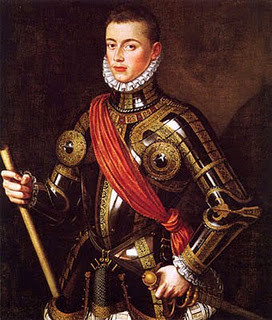
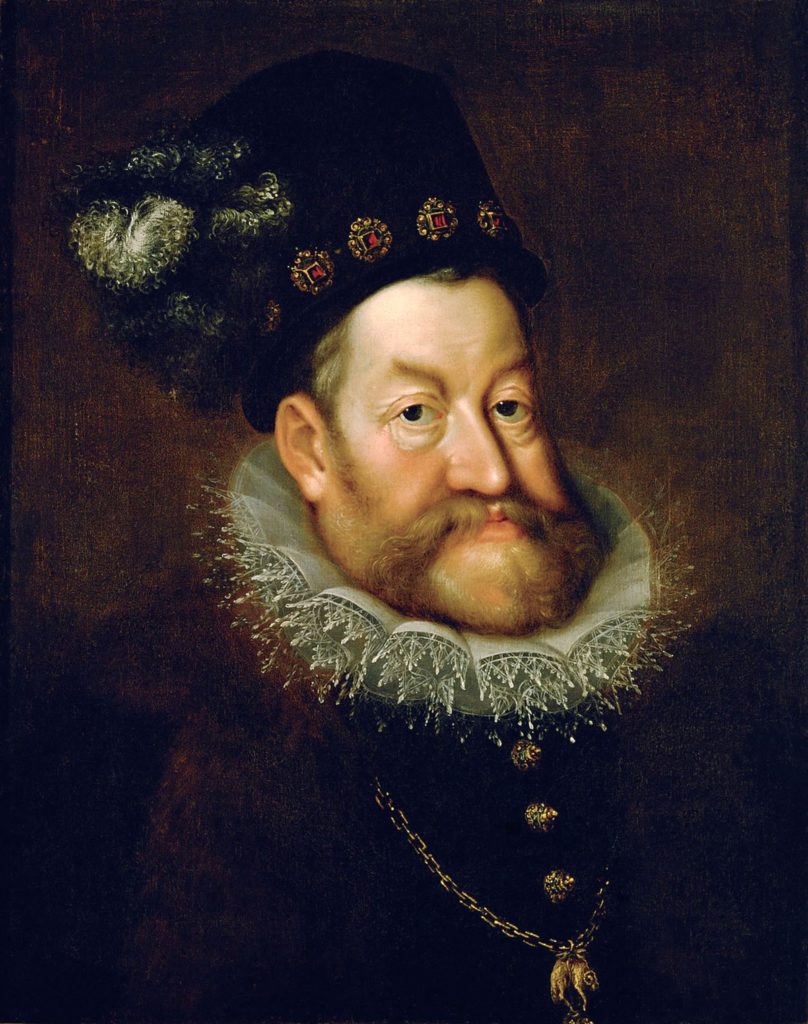
Born Don Julius Caesar d’Austria around 1584 or 1586, he was the eldest illegitimate child of Emperor Rudolf II and Kateřina Stradová, the Emperor’s long-term mistress whom he had six children with. Despite his illegitimate status, Rudolf II invested considerable hope and resources into Don Julius’s education and future prospects. It is likely that he wished for his firstborn to be raised in a traditional way, and eventually find a respectable place at the royal court. Unfortunately, Don Julius ended up walking a different path, one of debauchery and violence. It is for this reason that his father eventually sent him to Český Krumlov. There, he would reside at the old Rosenberg residence – Castle and Chateau Český Krumlov, and sad to say his troublemaking days were far from over.
From a young age, Don Julius had a tendency for aggression. He would terrorise servants and house pets alike, and fight rather roughly with his child companions. The older he became, the longer the list of his transgressions. It did not take long for overindulgence in alcohol and sex to join the party, both of which were made worse by rising sadistic inclinations, all the while his fighting started extending to the streets, where he and his followers would bully the townsfolk.
Once Don Julius’ behaviour became too abrasive to live in either of the Habsburgs’ main residences – Vienna and Prague, Rudolf II made the decision to tuck his eldest away someplace where his disagreeable behaviour wouldn’t be constantly witnessed by so many, particularly amongst the influential social circles. He also still hoped that perhaps he could be tamed over time, given the proper care. The Emperor chose Český Krumlov as this place. Arriving in 1605, Don Julius settled into his new home, however not for long. In line with his faith in the potential redeeming of his son, Rudolf II sent him to a cloister in Austria, in the town of Gaming, wishing that he be disciplined a bit before finally settling down in Český Krumlov. Unfortunately for everyone involved, the highly restrictive lifestyle within a religious institution only caused Don Julius to act out more than ever before. By the autumn of 1607 he returned to Český Krumlov, where he would remain until his death on June 25th, 1609. And though it may seem, dear reader, that two years are a short while, I can assure you that you have yet to hear the most dreadful parts of d’Austria’s story.
Fatal Meeting Disguised as Love at First Sight – The Tragic Fate of Markéta Pichlerová
In the remaining months of 1607, Don Julius met a young woman by the name of Markéta Pichlerová, a daughter of a local barber Zikmund Pichler and his wife Lucie Pichlerová. As part of his exploits, the young man used to visit local cottages in search of young women to sleep around with, and it is likely that his first encounter with Markéta was no different. Where it did differ was that after their initial meeting, Don Julius asked permission of her parents for Markéta to come live with him, at the royal residence. The parents granted it, seeing that the two seemed to be in love, and glad that Markéta found herself such a high-classed suitor. They would come to deeply regret this.
An occasion came after some time of Markéta and Don Julius living together where the Emperor’s son got angry at his lover, and true to his troubled nature, reached for a knife and proceeded to stab and slash at her repeatedly. The wounds he inflicted on Markéta were severe, and thinking she was dead, he lifted her body and threw it out of the castle’s window.
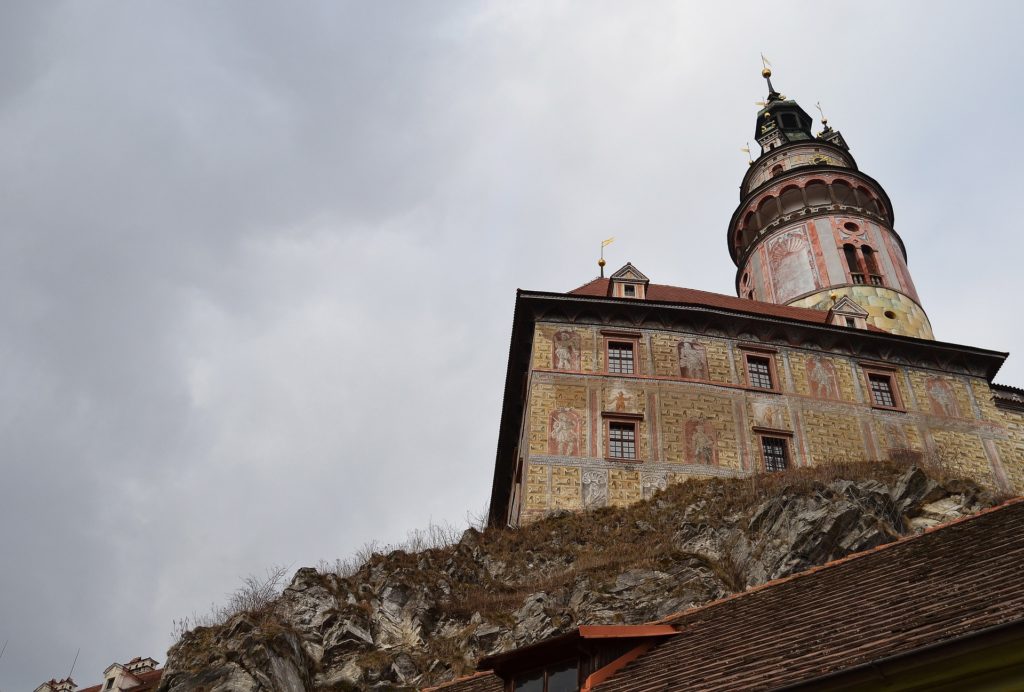
The Records of Václav Březan – Historical Accounts
Here is where I am able to enrich my storytelling with the words of those who witnessed these frightening events unfold. At the time of d’Austria’s stay Český Krumlov, the Rosenberg chronicler Václav Březan still lived in the city, and in his archives, he detailed some of the following events. He wrote:
“She was so terribly damaged that she was no longer a single piece of body, and in this condition she was thrown by him to the rocks. But it wasn’t meant to be her last hour, because she fell on a rubbish heap which saved her life. “
By some miracle, or perhaps Markéta’s own courage and strength of will, the young woman made her way back to her home. There she reunited with her parents, who, appropriately horrified by her condition, began to patch her up. Thankfully Markéta’s father was something called a “lazebník” which, though predominantly comprising the profession of a barber, also included various healing and rehabilitative methods. Still, Markéta only got to spend little time at home in recovery before her troubled lover caught up with her.
“Once she was healthy again she hid herself from him, but he kept returning to her mother so Markéta had to go to him again.”
Days after her arrival, a dread-ridden letter arrived at the Pichler household. The Emperor’s son has learned of Markéta’s survival, and wishes for her to come back to him at the Castle. Suffice to say neither Markéta nor her parents were willing to comply with this demand. That is until Don Julius showed up at their door.
Vicious Threats and an Impossible Choice
Standing face to face with d’Austria, Markéta’s parents refused to expose their daughter to the same danger again. Alas, he would not back down, and ordered the father to be thrown in prison, where he spent the next 3 weeks. Still, the mother was firm in her refusal of his demand, and that is when he vowed that he would have the father hanged if Markéta did not come to stay with him again.
It is hard to say who the decision came down to in the end; whether the mother kept her position even despite this horrific condition and it was Markéta who couldn’t bear to see her father die, or vice versa, but in the end, the two women agreed to a short visit. Markéta would come to stay at the Castle for perhaps a day or two, see how it is, if she and Don Julius can coexist peacefully, if anything has changed. Then, the father would live.
What followed can only be described as a harrowing tragedy. I will look once again to Václav Březan to tell you:
“on the 18th of February, Julius, that awful tyrant and devil, bastard of the Emperor, did an incredibly terrible thing to his bed partner, the daughter of a barber, when he cut off her head and other parts of her body, and people had to put her into her coffin in single pieces.”
(Václav Březan, The Rosenberg History, written cca 1602-1618)
The tragic incident, once word of it spread, shocked European aristocratic circles, forcing Emperor Rudolf II at last to publicly denounce his son’s actions and confine him to the Castle’s walls, for life. It was clear now that there was no redeeming his eldest, nor could he continue to try and hide him away without any accountability.
Don Julius’s mental state further deteriorated following Markéta’s death, leading to increasingly erratic behaviour. His schizophrenia, which is by today’s knowledge one of his likely diagnoses, worsened drastically. He also refused to eat, sleep, wash or maintain himself and his surroundings in any way. Soon, being anywhere near him became almost unbearable. Servants and family alike were avoiding him as he shifted between manic episodes and near-catatonia, until his eventual passing on June 25th, 1609, at no more than 25 years of age.
Don Julius’s funeral arrangements were made swiftly, and he was laid to rest at the Minorite monastery in Český Krumlov. Plans to relocate his remains to a more fitting resting place never went through, as Emperor Rudolf II passed away before they could be realised, leaving Don Julius’s grave untraceable to this day.
Grim Trouble in the Habsburg Line
Though thankfully not as violently troubled as his son, it cannot be said that Emperor Rudolf II was free of mental and spiritual torments. He passed away in 1612, only 3 years after his firstborn, and looking back on their story, one can guess why the Emperor tolerated his son’s dangerous behaviour almost till the very end. Though Rudolf II did not have, as far as we know, a violent inclination, he was no stranger to inner torment. Many of his time described him as a solitary individual, prone to depression and melancholy, and some even said that through all of his occult dealings, he was possessed by evil spirits.
Whether there was some dark magic involved or not, we do now know that from 1516 to 1700, over 80% of the Habsburg marriages were facilitated between close blood relatives, and this inbreeding cost the dynasty dearly. From physical deformities to grave psychological afflictions, the story of Don Julius d’Austria is one of many, though it certainly ranks amongst the most ghastly.
The Phantoms of Český Krumlov
Believe it or not, dear reader, the eerie energy left behind by Don Julius is also nowhere near the only supernatural presence haunting Český Krumlov. In fact, the remarkable historical city is home to many a tormented spirit. So allow me, before we say goodbye, to introduce you to a couple of them.
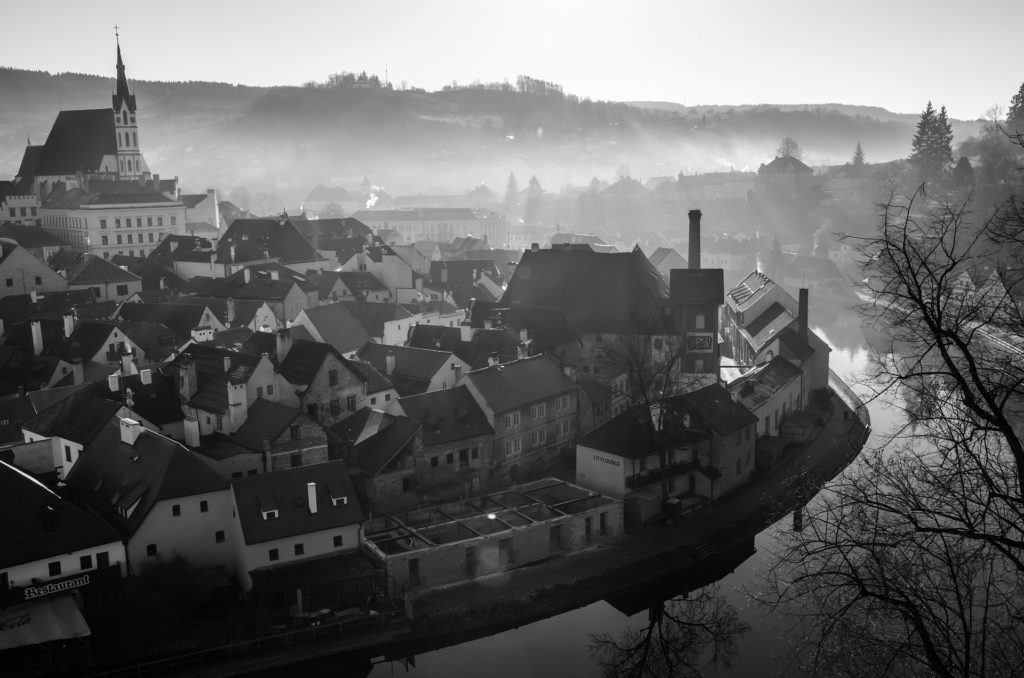
The White Lady von Rosenberg
Perchta von Rosenberg, now known as the White Lady, resided at Castle Český Krumlov during the 15th century. Despite her wishes, her father, Ulrich II. von Rosenberg, arranged her marriage to the cruel Moravian lord Johann von Lichtenstein. Throughout her life, Perchta suffered at his hands. Upon his deathbed, Johann sought forgiveness from Perchta, but she refused, leading him to curse her. Since then, the spirit of the White Lady von Rosenberg has been bound to the Rosenberg castle, often appearing before significant events. If she is wearing white gloves it signifies good news, while black gloves foretell impending disaster.
A Final Masquerade
This is a tale of a servant who in the midst of a masquerade ball at the Castle witnessed a string of pearls slipping off a lady’s neck. Tempted to seize the opportunity and keep the necklace, the servant was only stopped by a group of soldiers from a painting on a nearby wall who came to life and stepped out onto the masquerade floor. This naturally scared the servant half to death and stopped him from committing the immoral act. Insead, he returned the necklace to the lady and thereafter lived an honest life.
Magical Lake in the Castle Gardens
This little lake on the Castle grounds is connected with captivating tales of naiads, female spirits from mythology that preside over wells, streams, fountains and also lakes. They are said to gracefully dance under the moon’s glow, and legend has it that a buried treasure lies somewhere within the lake, protected by these naiads, and also dwarfs. Should they favour someone, they may share a portion of the treasure. However, the tale speaks of a magical word that one must figure out first. Whoever unravels this enchanting word may claim the treasure for themselves.
The Rosenberg Butler
Within the Český Krumlov Castle lies a network of cellars that once held very old and precious wine, rumoured to have been buried and stored there ages ago, perhaps by some of the first Rosenbergs. Legend has it that a butler who served the Rosenberg family was so diligent that he continued to watch over the wine centuries after his passing. Not only that, he would offer expert guidance to his successors, aiding them in discovering the most exquisite wines.
These, dear reader, provide but a glimpse into the supernatural world of Český Krumlov. There are tales that this article does not even begin to touch on, partly due to limited capacity, but also in the hopes that perhaps one day, you may feel enchanted by them enough to seek out a little adventure, and visit the mysterious city yourself.
Neli Kozak

